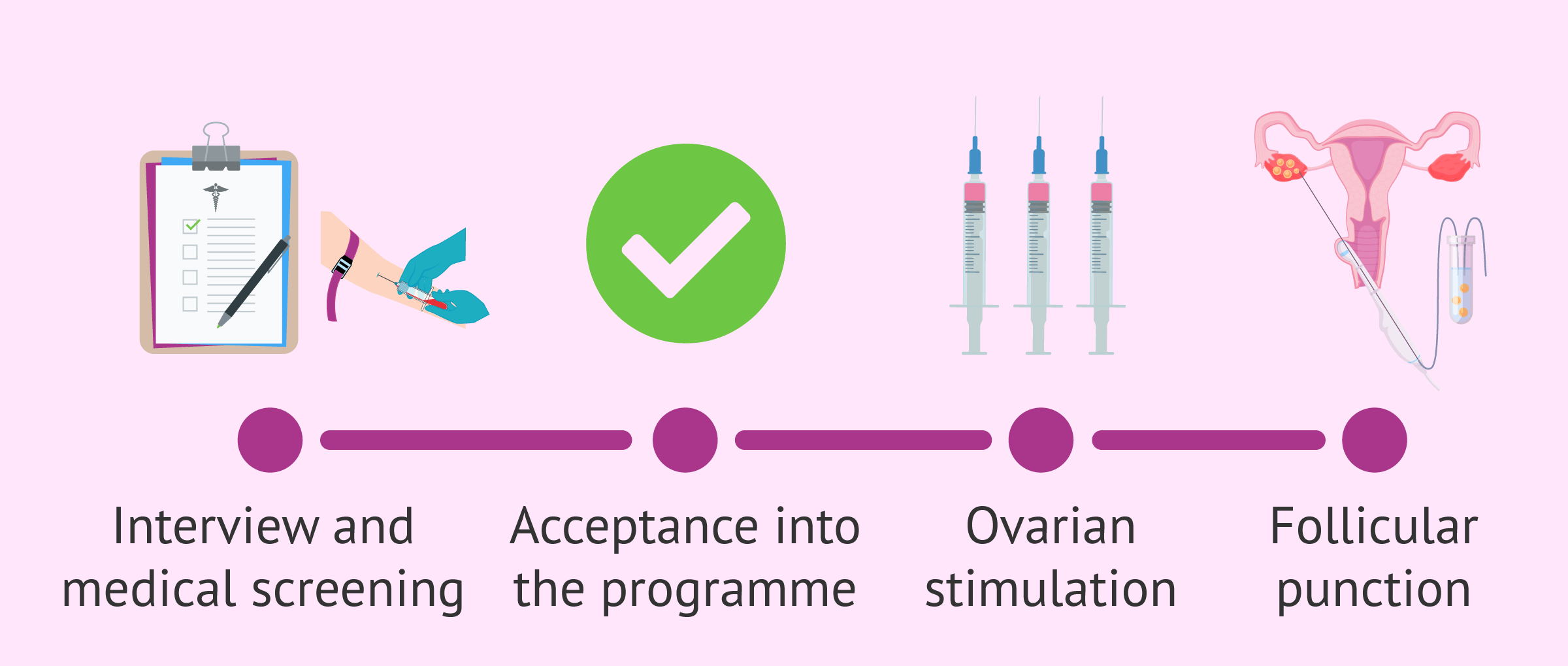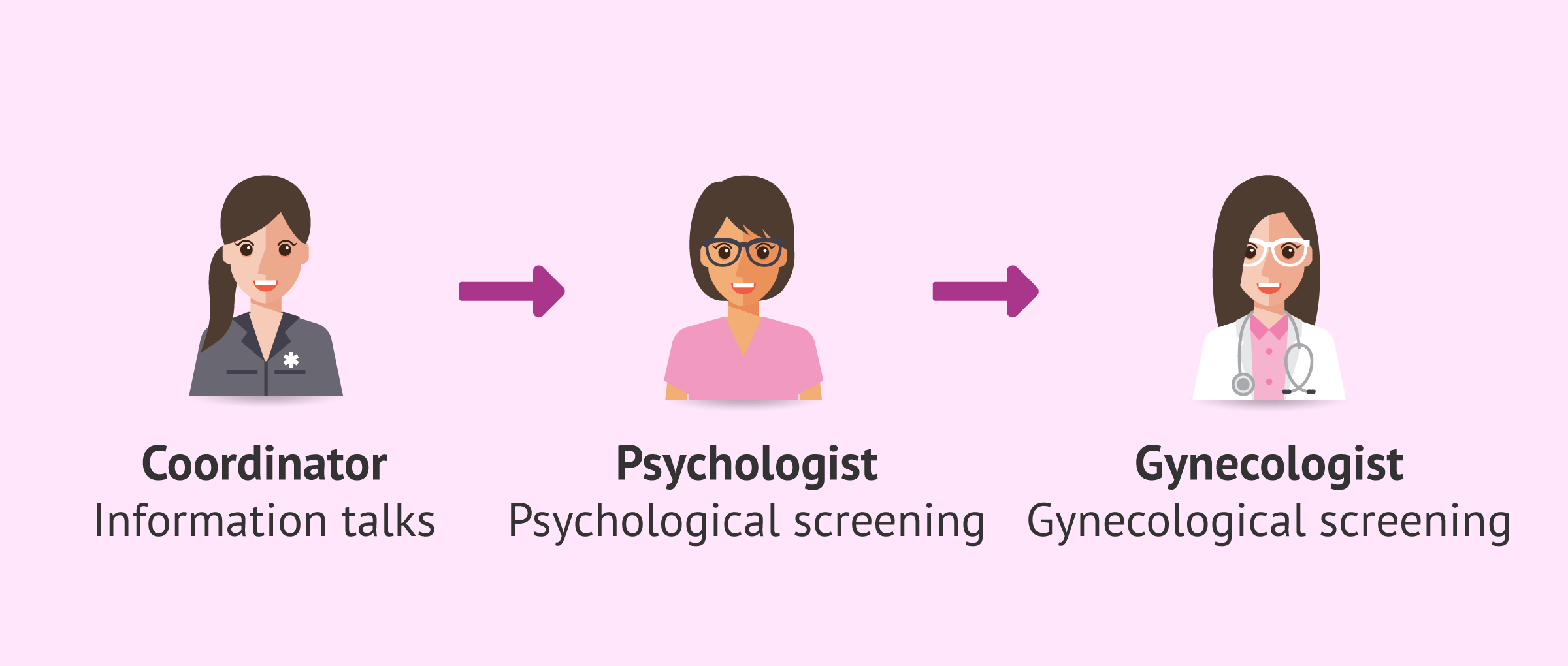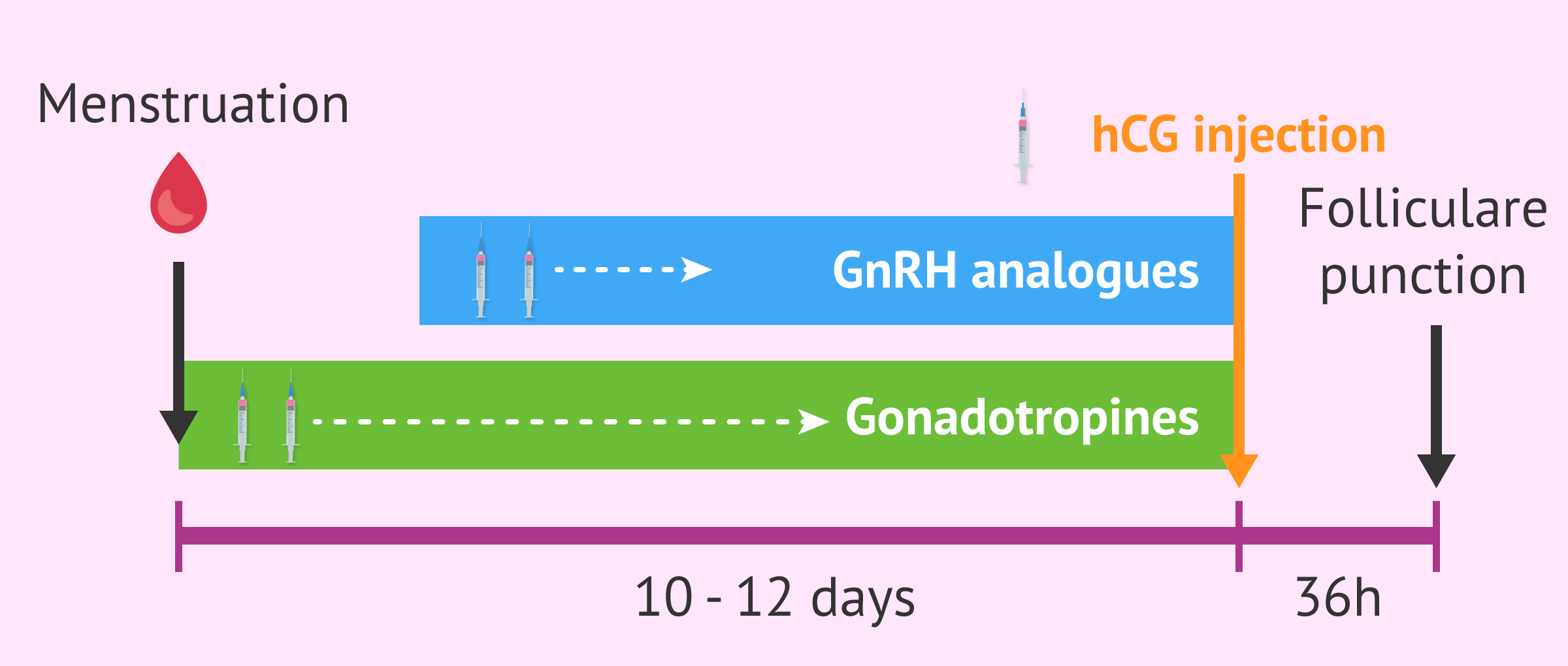Women who want to become egg donors will have to go to a fertility clinic to be informed and, if they are interested and meet the requirements required by law, pass a series of medical and psychological tests.
Once a woman is considered eligible to donate eggs, she will have to go through a fertility treatment that basically consists of two steps:
- Controlled ovarian stimulation
- Follicular puncture
This is how the eggs are obtained from the donors, which can be fertilized fresh or vitrified and preserved for a future egg recipient.
Provided below is an index with the 6 points we are going to expand on in this article.
- 1.
- 2.
- 2.1.
- 2.2.
- 3.
- 3.1.
- 3.2.
- 3.3.
- 3.4.
- 3.5.
- 4.
- 5.
- 6.
Chosing the egg donor
The procedure to become an egg donor begins with two personal interviews at the chosen fertility clinic to make the donation. These interviews consist of the following:
- First interview
- a clinic coordinator explains to the donor candidate what the treatment consists of, the advantages and possible risks, as long as all the information is available to her.
- Second interview
- the medical history of the future donor is opened and she signs the informed consents indicating her desire and commitment to be an egg donor. In this second interview, the woman also meets with the center's psychologist to make a psychological assessment and determine if she is mentally prepared to assume what it means to be an egg donor.
Without the psychologist's approval, even if the medical tests have correct results, the woman cannot be accepted as an egg donor.
As the next step, the egg donor selection process continues with a gynecologist to perform all the physical exams and medical tests that will determine if her health status is appropriate for egg donation.
As Nursing and Care Coordinator Rocío Fuentes tells us:
Egg donors have to undergo many tests. A gynecological check-up consisting of a Pap smear, breast examination, vaginal cultures, etc.; a battery to rule out anemia or sexually transmitted diseases and, subsequently, a genetic analysis to see that they are not carriers of certain diseases that are more common in our country.
Once it has been verified that all the medical and psychological tests have been carried out correctly and that the woman meets all the requirements demanded by Law, she is admitted by the center as an egg donor.
You can get all this more detailed information in the following article: What are the requirements for egg donation?
Egg Donation Procedure
Fertility treatment to donate eggs basically consists of administering hormonal medication to cause multiple follicular development in the ovaries and then extracting the eggs that have grown through a simple surgical intervention.
In the following sections we are going to describe these two procedures in detail.
Ovarian stimulation
This stage of treatment may vary depending on each donor and the type of egg donation, i.e. whether fresh eggs will be donated or whether they will be vitrified.
In the first case, it would be necessary to synchronize the donor's menstrual cycle with the recipient's and contraceptive pills would be used first.
Regardless of whether contraceptives are used or not, controlled ovarian stimulation begins at the beginning of the menstrual cycle, when menstruation arrives, and consists of giving the donor subcutaneous injections of hormonal drugs to produce the simultaneous maturation of several eggs.
These drugs contain as active ingredient gonadotropin hormones, these are FSH and LH, and also some analog of GnRH to prevent spontaneous ovulation.
In summary, these are two different types of injections that the donor will have to administer as indicated by the gynecologist. Normally, donors receive a medication sheet that specifies the amount and day each drug should be injected.
During ovarian stimulation, from the seventh day of the menstrual cycle more or less, the donor will have to go to the clinic for continuous check-ups and observe the evolution of the ovarian follicles. These check-ups are done by means of vaginal ultrasounds and blood extractions every two or three days.
Once the ovarian follicles have reached 18-20 mm, the donor has to administer a last type of injection with the hormone hCG which is used to induce ovulation.
It is very important that this last injection is carried out 32-34 hours before the follicular puncture, since if more time passes a spontaneous ovulation could occur and all the eggs are lost.
Ovarian Puncture
Ovarian puncture or follicular puncture for the extraction of oocytes from the donor's ovaries consists of a very simple surgical intervention that is performed under sedation.
The procedure consists of a transvaginal ultrasound puncture that lasts about 15-20 minutes.
The gynecologist will use a suction needle to aspirate each of the follicles that have been growing, inside which are the eggs. The follicular liquid will pass through negative pressure through an aspiration system to reach the collection tubes, which will be systematically passed to the laboratory.
After this procedure, the donor is admitted to the clinic for a few hours until she recovers from the anesthesia. In the days following surgery, it is important to remain in contact with the fertility clinic to ensure that no complications arise.
Once the donor is on her period again, the whole process is over and the donor can continue with her daily routine. If a woman decides to donor her eggs again, she would have to wait a reasonable time of 4-5 months.
FAQs from users
Can any woman over the age of 18 be an egg donor?
Any woman over the age of 18 who is interested in donating eggs can contact a reproduction clinic to start the selection process. This process is very demanding and in the end, only women who complete it satisfactorily will be able to donate.
The process of donating eggs begins with a gynecological interview with a study of the medical history and family background. A complete gynecological examination is performed, including an assessment of the ovarian reserve. The next step is a psychological interview and a blood test with a study of hormones, infectious diseases, and genetic diseases.
Once all these stages have been passed and if satisfactory results are obtained, the candidate for egg donation can then make the first egg donation.
This selection process is necessary for the safety of patients who come to fertility centers to undergo egg donation or IVF treatments with donor eggs.
What steps should a woman follow before donating eggs?
Before donating eggs, the first thing to do is to become well informed about the process, the implications, and the legislation in the respective country.
There are laws that state that the donation must be altruistic, anonymous and that women must be between 18 and 35 years old. In some other countries such as the U.S., however, egg donors are eligible for economic compensation.
Potential egg donor candidates must follow four main steps:
- Physical and psychological screenings.
- Ovarian stimulation.
- Ovum pick-up.
- Control ultrasound.
How many eggs are usually harvested from an egg donor?
Since egg donors are young women with good ovarian reserves, the number of eggs retrieved after ovarian stimulation and follicular puncture is higher than that obtained in patients suffering from infertility.
It is difficult to determine exactly how many eggs can be harvested, but usually between 10 and 20 mature eggs are obtained.
How long does the egg donation process take?
The total time it can take for an egg donor to be accepted and to go through the whole process depends a little on the time needed to do the medical tests and interviews with the specialists, i.e. the first part of the procedure.
Once the donor has been accepted, the ovarian stimulation takes about 12-14 days until the follicular puncture is performed. This is how long the donor will have to be injecting the hormone medication daily.
Does donating eggs hurt?
Egg donation is painless because it is performed under anesthesia in the operating room. However, the woman may have some discomfort due to the hormonal medication administered during ovarian stimulation, such as abdominal swelling, bruising at the injection site, fatigue, etc.
Find more about symptoms and side effects of egg donation here: What are the potential risks of egg donation?
Suggested for you
The process of ovarian stimulation in an egg donation is practically the same as that followed by patients undergoing in vitro fertilization (IVF) treatment. If you want to learn more about all the aspects related to this, you can continue reading here: Ovarian stimulation protocols for IVF- process and medications used.
Follicular puncture or ovum pick up is done in the same way in donors as in IVF patients. Here you have the whole process in detail: Ovum pick-up procedure- How are eggs harvested in IVF?
We make a great effort to provide you with the highest quality information.
🙏 Please share this article if you liked it. 💜💜 You help us continue!
References
Alper MM, Fauser BC. Ovarian stimulation protocols for IVF: is more better than less? Reprod Biomed Online. 2017 Apr;34(4):345-353.
Caligara C, Navarro J, Vargas G, Simón C, Pellicer A, Remohí J. The effect of repeated controlled ovarian stimulation in donors. Hum Reprod. 2001 Nov;16(11):2320-3.
Kalugina AS, Gabaraeva VV, Shlykova SA, Tatishcheva YA, Bystrova OV. Comparative efficiency study of fresh and vitrified oocytes in egg donation programs for different controlled ovarian stimulation protocols. Gynecol Endocrinol. 2014 Oct;30 Suppl 1:35-8.
Melnick AP, Rosenwaks Z. Oocyte donation: insights gleaned and future challenges. Fertil Steril. 2018 Nov;110(6):988-993.
Ovodonante.com, 2017, Donar óvulos paso a paso: ¿Cuál es el procedimiento para ser donante?, Rebeca Reus, https://ovodonante.com/donar-ovulos/
Material gráfico facilitado por Ginemed Madrid.
FAQs from users: 'Can any woman over the age of 18 be an egg donor?', 'What steps should a woman follow before donating eggs?', 'How many eggs are usually harvested from an egg donor?', 'How long does the egg donation process take?' and 'Does donating eggs hurt?'.
Authors and contributors









On which criteria are egg donors matched with the future parents? Do they have a say in the selection process?
Hi!
They are selected on the basis of their phenotype and must have similar immunological characteristics to the intended mother.
Hope this helps,
Best